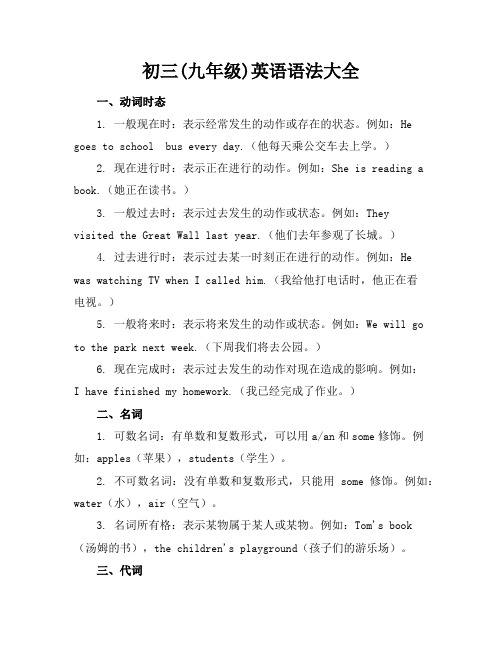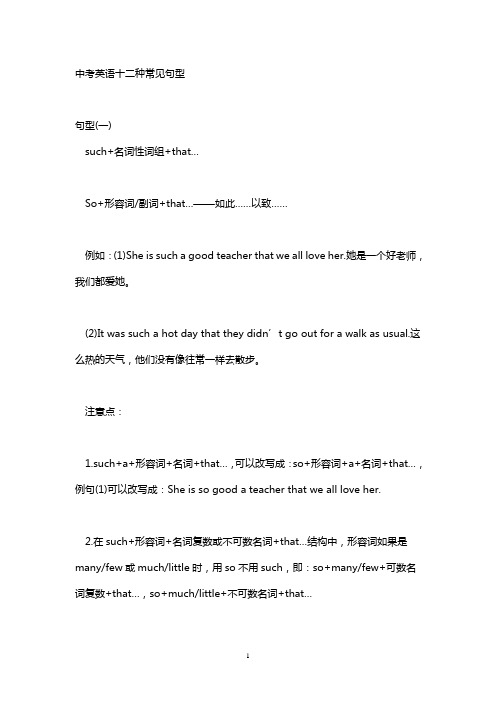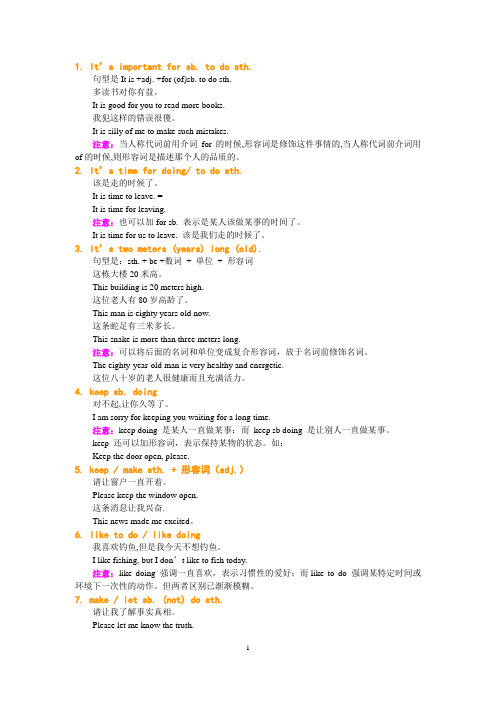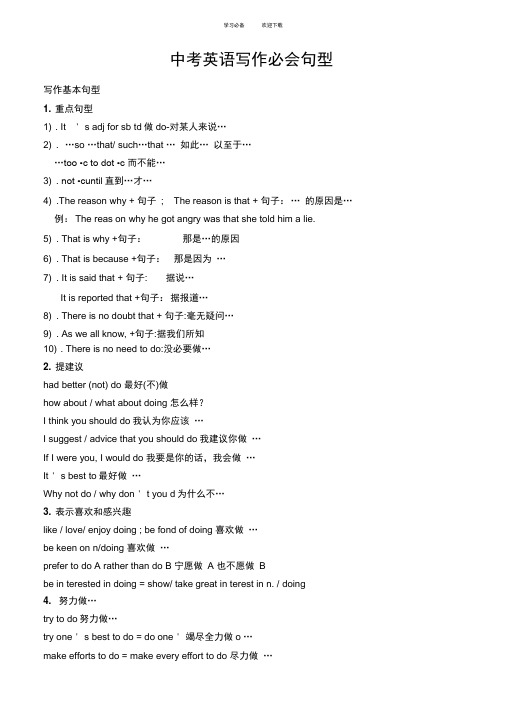中考英语常用的万能核心句型语法
初三(九年级)英语语法大全

初三(九年级)英语语法大全一、动词时态1. 一般现在时:表示经常发生的动作或存在的状态。
例如:He goes to school bus every day.(他每天乘公交车去上学。
)2. 现在进行时:表示正在进行的动作。
例如:She is reading a book.(她正在读书。
)3. 一般过去时:表示过去发生的动作或状态。
例如:Theyvisited the Great Wall last year.(他们去年参观了长城。
)4. 过去进行时:表示过去某一时刻正在进行的动作。
例如:He was watching TV when I called him.(我给他打电话时,他正在看电视。
)5. 一般将来时:表示将来发生的动作或状态。
例如:We will go to the park next week.(下周我们将去公园。
)6. 现在完成时:表示过去发生的动作对现在造成的影响。
例如:I have finished my homework.(我已经完成了作业。
)二、名词1. 可数名词:有单数和复数形式,可以用a/an和some修饰。
例如:apples(苹果),students(学生)。
2. 不可数名词:没有单数和复数形式,只能用some修饰。
例如:water(水),air(空气)。
3. 名词所有格:表示某物属于某人或某物。
例如:Tom's book(汤姆的书),the children's playground(孩子们的游乐场)。
三、代词1. 人称代词:I(我),you(你/你们),he(他),she(她),it(它),we(我们),they(他们)。
2. 物主代词:my(我的),your(你的/你们的),his(他的),her(她的),its(它的),our(我们的),their(他们的)。
3. 指示代词:this(这个),that(那个),these(这些),those(那些)。
初三英语中考重点语法

初三英语中考重点语法:一、时态1.一般现在时-用法:表示经常发生的动作或存在的状态;表示客观事实、真理等。
-标志词:always, usually, often, sometimes, every day/week/month/year 等。
-结构:主语+动词原形(当主语为第三人称单数时,动词用第三人称单数形式)。
2.一般过去时-用法:表示过去某个时间发生的动作或存在的状态。
-标志词:yesterday, last week/month/year, ago, in +过去的年份等。
-结构:主语+动词的过去式。
3.一般将来时-用法:表示将来某个时间要发生的动作或存在的状态。
-标志词:tomorrow, next week/month/year, in the future 等。
-结构:will +动词原形;be going to +动词原形。
4.现在进行时-用法:表示现在正在进行的动作。
-标志词:now, at the moment, look, listen 等。
-结构:be +动词的现在分词。
5.过去进行时-用法:表示过去某个时刻正在进行的动作。
-标志词:at that time, at +过去的时间点等。
-结构:was/were +动词的现在分词。
6.现在完成时-用法:表示过去发生的动作对现在造成的影响或结果;表示从过去一直持续到现在的动作或状态。
-标志词:already, yet, just, ever, never, since +时间点,for +时间段等。
-结构:have/has +动词的过去分词。
二、被动语态1.一般现在时的被动语态:am/is/are +过去分词。
2.一般过去时的被动语态:was/were +过去分词。
3.一般将来时的被动语态:will be +过去分词;be going to be +过去分词。
4.现在完成时的被动语态:have/has been +过去分词。
三、宾语从句1.引导词:that(在口语或非正式文体中可省略),if/whether(是否),特殊疑问词(what, who, when, where, why, how 等)。
初三英语重要句型

初三英语重要句型第一篇:初三英语重要句型吴老师(Desmond)初中英语内部讲义英语中考常考重要句型1.allow sb to do sth 允许某人去做某事(后接动词不定式)My father allowed me to go out for a walk after finishing my homework.2.asked sb(not)to do sth 叫某人做事某事(叫某人不要去做某事)My father asked me to study hard.He asked me not to swim alone.be asked to do sth 被叫去做某事/被邀请去做某事 I was asked to have a dinner with them yesterday.3.be afraid to do sth 害怕做某事She is afraid to ask me questions.4.be afaid of doing sth 害怕做某事I am afraid of going out at night.5.be afaid of sth 害怕某物He is afraid of snakes.6.be amazed to do sth 对做某事感到惊讶 He was amazed to meet the girl there.be amazed at sth 对某事感到惊讶they were amazed at the news.7.be busy doing/with sth 忙于做某事(常考)e.g: I was busy washing my car at that time.那时候我正忙于清洗我的车子。
I am busy with my work.8.be coming/going/leaving/fiying/moving/dying(某些位移动词用进行时态时表将来)the bus is coming/the dog is dying.9.be excited to do sth 对做……感到兴奋Jacky was excited to travel there by plane.be excited at sth Lily was excited at his words.be excited about doing sth he was excited about passing the exam without going overing books.10.be frightened to do sth 害怕去做某事Sam is frightened to ride a horse.11.be glad/happy to do sth 高兴去做某事she is happy to clean the blackboard with me.be pleased to do sth高兴做某事she was pleased to help the old man yesterday.be pleased with sth 对某事感到高兴/满意The teacher was pleased with my answer.12.be interested in sth/doing sth 对某事感兴趣/对做某事感兴趣she is interested in swimming in the river.My btother is interested in Chinese.13.be/get ready for/to do sth Be ready for sth 为某事做好了准备We are ready for the exam.Be ready to do sth 为做某事做好了准备 We are ready to have a birthday party for her.get ready for sth为某事在做准备We are getting ready for the exam.get ready for sth 为做某事而做准备13.be sorry to do sth 对做某事感到抱歉14.be surprised to do sth 对做某事感到惊奇be surprised at sth 对某事感到惊奇 15.be worth doing sth 值得做某事(worth 后接动词-ing形式,常考)16.begin to do sth begin/start to do/doing sth(开始去做某事)17.can/be able to afford(to buy)sth 有能力购买(供)…… 18.can/may/must do sth could/would/should/might do sth 19.can’t wait to do sth 迫不急待地去做某事 20.decide to do sth 决定去做某事make up one’s mind to do sth 下决心去做某事(常考)Remember : No pains,nogains吴老师(Desmond)初中英语内部讲义make a decision to do sth 对做某事作出决定 21.deserve to do sth 值得/应该做……22.encourage sb to do sth 鼓励某人去做某事 23.enjoy doing sth 乐意去做某事 24.expect(sb)to do sth 期望去做某事 25.fail to do sth 做某事失败 succeed doing sth 成功做了某事26.finish doing sth 做完某事(后接动词-ing形式)(常考)27.follow sb to do sth 跟随某人去做某事 28.get sb to do sth make sb do sth let sb do sth(让某人做某事(后接动词原形))29.get/havea chance to do sth 得到一个做某事的机会30.give/pass/show/lend/sell sb sth/sth to sb buy/get/bring sb sth/sth for sb31.go on to do sth 继续做事(常考)go on doing sth 继续做事(常考)32.hate to do/doing sth 讨厌/不喜欢做某事 33.have fun doing sth 34.have problems doing sth 做某事遇到困难 35.have sb do sth have sth donehave sth to do 工有事要做36.hear sb do sth 听到某人做某事(后接动词原形,常考)hear sb doing sth 听到某人正在做某事(常见)37.help to do sth 帮忙做某事help sb(to)do sth 帮助某人做某事 38.hope/wish to do sth 希望做某事 wish sb to do sth 希望某人做某事39.I t seems that 这像是……(后接从句)seem to do sth seem +adj40.It’s + adj+(for sb)to do sth.It’s+adj +(of sb)to do sthe.g: It’s glad for him to hear the news.41.It takes sb some time/money to do sth.花费某人多长时间做某事(常考)42.pay …for… cost spend…on…..it take …to do sth 43.It’s best for sb to do sth.对某人来说做某事是最好的had better do sth 最好做某事(注意had没有时态和人称的变化,better后接动词原形)44.It’s time for sb to do sth 是某人做某事的时候了45.keep(on)doing sth 坚持做某事(常考)keep sb doing sth 让某人做某事(常考)keep sb from doing sth 阻止某人做某事(常考)keep sb/sth +adjkeep the book for 2 days 借这本书两天(不要用borrow或lend)Remember : No pains,nogains吴老师(Desmond)初中英语内部讲义46.learn to do sth 学做某事 learn sth from sb 向某人学习47.like to do/doing sth 喜欢做某事 like sb to do sth 喜欢某人做某事 48.need to do sthneed doing sth/to be doneneed sth needn’t do sth(需要做某事)49.prefer to do sth rather than do sth 宁愿……而不愿……(常考)prefer doing sth to doing sth 喜欢做……胜过做……e.g: I prefer reading books to going shopping.比起购物来,我更爱读书。
初中英语重点句型、短语(中考必背!)

[短语、词组归纳]由动词开头构成的短语、词组很多。
复习时应分类处理:一、动词+介词1.look at…看…,look like … 看上去像……,look after …照料… 2.listen to…听……3.welcome to…欢迎到……4.say hello to …向……问好5.speak to…对……说话此类短语相当于及物动词,其后必须带宾语,但宾语无论是名词还是代词,都要放在介词之后。
二、动词+副词“动词+副词”所构成的短语义分为两类:A.动词(vt.)+副词1.put on 穿上 2.take off脱下 3.write down记下此类短语可以带宾语,宾语若是名词,放在副词前后皆可;宾语若是人称代词,只能放在副词的前面。
B.动词(vi)+副词。
1.come on赶快 2.get up起床 3.go home回家4.come in进来 5.sit down坐下 6.stand up起立此类短语属于不及物动词,不可以带宾语。
三、其它类动词词组1.close the door2.1ook the same3.go to work/class4.be ill5.have a look/seat6.have supper7.1ook young 8.go shopping 9.watch TV/games10. play games[介词短语聚焦]“介词+名词/代词”所构成的短语称为介词短语。
现将Unitsl-16常用的介词短语按用法进行归类。
1.in+语言/颜色/衣帽等,表示使用某种语言或穿着……。
2.in + Row/ Team/ Class/ Grade等,表示“在……排/队/班级/年级”等。
3.in the morning/ afternoon/ evening/ 表示“在上午/下午/傍晚”等一段时间。
4.in the desk/ pencil-box/bedroom 等表示“在书桌/铅笔盒/卧室里”。
初中英语十二种常见句型

中考英语十二种常见句型句型(一)such+名词性词组+that…So+形容词/副词+that…——如此……以致……例如:(1)She is such a good teacher that we all love her.她是一个好老师,我们都爱她。
(2)It was such a hot day that they didn’t go out for a walk as usual.这么热的天气,他们没有像往常一样去散步。
注意点:1.such+a+形容词+名词+that…,可以改写成:so+形容词+a+名词+that…,例句(1)可以改写成:She is so good a teacher that we all love her.2.在such+形容词+名词复数或不可数名词+that…结构中,形容词如果是many/few或much/little时,用so不用such,即:so+many/few+可数名词复数+that…,so+much/little+不可数名词+that…(1)There are so many people in the room that I can’t get in.房间里人太多,我进不去。
(2)The man has so much money that he can buy a car.那人很有钱,他能买一辆小汽车。
句型(二)There be…,either…or…,neither…nor…,not only…but also…例如:(1)There is a pen and two pencils in his pencil-box.他的铅笔盒里有一支钢笔和两支铅笔。
(2)Not only you but also I have been to the Great Wall.你和我都没有去过长城。
(3)Either you or I am leaving for Shanghai.要么你去上海,要么我去上海。
中考英语必考语法大全

中考英语必考语法大全一. 动词be(is,am,are)的用法我(I)用am, 你(you)用are,is跟着他(he)、她(she)、它(it)。
单数名词用is,复数名词全用are。
变否定,更容易,be后not加上去。
变疑问,往前提,句末问号莫丢弃。
还有一条须注意,句首大写莫忘记。
二. this,that和it用法(1)this和that是指示代词,it是人称代词。
(2)距离说话人近的人或物用this, 距离说话人远的人或物用that。
如:This is a flower. 这是一朵花。
(近处)That is a tree. 那是一棵树。
(远处)(3)放在一起的两样东西,先说this, 后说that。
如:This is a pen. That is a pencil. 这是一支钢笔。
那是一支铅笔。
(4)向别人介绍某人时说This is…, 不说That is…。
如:This is Helen. Helen, this is Tom. 这是海伦。
海伦,这是汤姆。
(5)This is 不能缩写, 而That is可以缩写。
如:This is a bike. That’s a car. 这是一辆自行车。
那是一辆轿车。
(6)打电话时,介绍自己用this, 询问对方用that。
如:—Hello! Is that Miss Green? 喂,是格林小姐吗?—Yes, this is. Who’s that? 是的,我是,你是谁?注意:虽然汉语中使用“我”和“你”,但英语中打电话时绝不可以说:I am…, Are you…?/Who are you?(7)在回答this或that作主语的疑问句时, 要用it代替this或that。
如:①—Is this a notebook? 这是笔记本吗?—Yes, it is. 是的,它是。
②—What’s that? 那是什么?—It’s a kite. 是只风筝。
三. these和those用法this, that, these和those是指示代词,these是this的复数形式,指时间、距离较近的或下面要提到的人或事;those是that的复数形式,指时间、距离较远或前面已经提到过的人或事物。
中考英语必备50个句型

1. It’s important for sb. to do sth.句型是It is +adj. +for (of)sb. to do sth.多读书对你有益。
It is good for you to read more books.我犯这样的错误很傻。
It is silly of me to make such mistakes.注意:当人称代词前用介词for的时候,形容词是修饰这件事情的,当人称代词前介词用of的时候,则形容词是描述那个人的品质的。
2. I t’s time for doing/ to do sth.该是走的时候了。
It is time to leave. =It is time for leaving.注意:也可以加for sb. 表示是某人该做某事的时间了。
It is time for us to leave. 该是我们走的时候了。
3. It’s two meters (years) long (old).句型是:sth. + be +数词+ 单位+ 形容词这栋大楼20米高。
This building is 20 meters high.这位老人有80岁高龄了。
This man is eighty years old now.这条蛇足有三米多长。
This snake is more than three meters long.注意:可以将后面的名词和单位变成复合形容词,放于名词前修饰名词。
The eighty-year-old man is very healthy and energetic.这位八十岁的老人很健康而且充满活力。
4. keep sb. doing对不起,让你久等了。
I am sorry for keeping you waiting for a long time.注意:keep doing 是某人一直做某事;而keep sb doing 是让别人一直做某事。
中考英语写作必会句型(万能必赢句型)

中考英语写作必会句型写作基本句型1. 重点句型1) . It ' s adj for sb td做do-对某人来说…2) . …so …that/ such…that … 如此… 以至于……too •c to dot •c 而不能…3) . not •cuntil直到…才…4) .The reason why + 句子; The reason is that + 句子:… 的原因是…例:The reas on why he got angry was that she told him a lie.5) . That is why +句子:那是…的原因6) . That is because +句子:那是因为…7) . It is said that + 句子: 据说…It is reported that +句子:据报道…8) . There is no doubt that + 句子:毫无疑问…9) . As we all know, +句子:据我们所知10) . There is no need to do:没必要做…2. 提建议had better (not) do 最好(不)做how about / what about doing 怎么样?I think you should do我认为你应该…I suggest / advice that you should do我建议你做…If I were you, I would do 我要是你的话,我会做…It ' s best to最好做…Why not do / why don ' t you d为什么不…3. 表示喜欢和感兴趣like / love/ enjoy doing ; be fond of doing 喜欢做…be keen on n/doing 喜欢做…prefer to do A rather than do B 宁愿做A 也不愿做Bbe in terested in doing = show/ take great in terest in n. / doing4. 努力做…try to do努力做…try one ' s best to do = do one ' 竭尽全力做o …make efforts to do = make every effort to do 尽力做…do what sb can (do ) to do 尽力做…spare no effort to do 不遗余力的做…do what / everything sb. can to do 尽某人全力做 …5. 打算做…/计划做… intend / plan to do 打算做 …; decide to do 决定做 …;be determined to de 决定做 …;6. 表示想/希望want to do = would like to do 想做 …; hope to do 希望做 …expect to do 期待着做 …; wish to do 希望做 …;consider doing 考虑做 … 固定句型look forward to doing 盼望做 …; keep on doing 坚持做 …dream of doing 梦想做…;can ' t help doin 情不自禁地做 … keep / stop / prevent sb. from doing 阻止某人做 …be busy (in ) doing be busy with + 名词 忙于做 …spend time / money (in )doing spend time / money on + 名词 : 花费时间做 …have fun / have a good time / enjoy on eself doing 玩得开心have trouble / have problem / have difficulty (in) doing 或 with + 名词: 做…有困难 开头句型我们常说,良好的开端等于成功的一半。
- 1、下载文档前请自行甄别文档内容的完整性,平台不提供额外的编辑、内容补充、找答案等附加服务。
- 2、"仅部分预览"的文档,不可在线预览部分如存在完整性等问题,可反馈申请退款(可完整预览的文档不适用该条件!)。
- 3、如文档侵犯您的权益,请联系客服反馈,我们会尽快为您处理(人工客服工作时间:9:00-18:30)。
中考英语常用的万能核心句型语法However,it is a pity that...(然而很可惜的是......)eg:However it is a pity that he always does not work hard.然而很可惜的是他总是不用功。
The reason why……(这就是…..的原因)eg:That is the reason why he didn't come to your party.那就是他没来参加你的聚会的原因。
used to do (表示过去常常做某事)eg:I used to get up early in the morning.我过去通常起到很早。
There be(表示某处有某物,通常被称为存在句)eg:There’s a boat in the river.河里有条船。
how 引导的感叹句eg:At least it will prove how honest you are. 那至少可以证明你很诚实。
I think / I don't think that …(我认为……/我认为……不)eg:He doesn't think I should stop him joining the club. 他认为我不应该阻止他参加这个俱乐部。
It's+adj.+for sb.+to do sth. (对某人来说做某事怎么样)eg:It is dangerous for children to play in the street. 孩子们在街上玩是很危险的。
such+名词性词组+that...;so+形容词/副词+that... 如此……以致……eg:She is such a good teacher that we all love her.她是一个好老师,我们都爱她。
It was such a hot day that they didn't go out for a walk as usual.这么热的天气,他们没有像往常一样去散步。
enjoy doing sth.(喜欢(爱好)做某事)eg:Do you enjoy listening to music? 你喜欢听音乐吗?want to do sth(想做某事)eg:I want to go to school。
我想去上学。
So+be/情态动词/助动词+主语eg:He is a student.So am I.他是一个学生,我也是。
like to do sth(想去做….事)eg:He doesn’t like to swim now.他现在不想去游泳。
be far from sp(离….地远)eg:His school is far from his home.他的学校离他家远。
be near to sp(离….地近)eg:The hospital is near to the post office.医院离邮局很近。
make it +时间(把时间定在.....)eg:Let’s make it 8:30.让我们把时间定在8:30吧。
not…until(直到…才)eg:He didn’t have supper until his parents came back.直到他的父母回来他才吃饭。
“比较级+and+比较级”或“more and more +原级”表示“越来越……”eg:It is getting cooler and cooler.天气越来越凉爽。
The wind became more and more heavily.风变得越来越大。
the+比较级….,the+比较级,表示“越……越……”。
eg:The more money you make,the more you spend.钱你赚得越多,花得越多。
The sooner,the better. 越快越好。
stop sb from doing sth/stop sb (from)doing sth(阻止某人做某事)eg:My mum stoped me from playing games。
我妈妈阻止我玩游戏。
The Great Green Wall will stop the wind from blowing the earth away.绿色长城将阻挡风吹走土壤。
both…and(两者都….)eg:Both John and Mary like ice cream. 约翰和玛丽都喜欢冰淇淋。
either…or(或者…或者;不是…就是…)eg:When the girl is happy,she either sings or dances.那个女孩高兴时,不是唱就是跳。
Neither…nor(既不…也不…;两者都不;均不)eg:Neither could theory do without practice, nor could practice do without theory.理论没有实践不行,实践没有理论也不行。
Though...+主句(尽管…;虽然)eg:Though she doesn't love me,I will love her forever.虽然她不爱我,但我永远爱她。
be different from(不同于;与…不同)eg:I think this is different from Chinese names.我认为这与汉语名字不同。
Welcome to sp(欢迎来到….)eg:Welcome to China.欢迎来到中国。
have fun doing(愉快的做某事;做某事很高兴)eg:We’re going to have fun learning and speaking English this term.这学期我们将兴味盎然地学习和讲英语。
because /so(因为….)I don’t know all your names because this is our first lesson.因为这是我们的第一节课,所以我并不知道你们所有人的名字。
Why don’t you do(你怎么不做….事呢?)=Why not do...(怎么不做….事呢?)eg:Why don’t you come to school a little earlier?你为什么不早点到学校呢?Why not play football with us?为什么不和我们踢足球呢?buy sb sth(为某人买某物)eg:Mother bought me a bike.妈妈给我买了一辆自行车。
start doing sth(开始做某事)eg:I started learning English in 1983.我在1983年开始学习英语。
have nothing to do(无事可做)eg:In class, I have nothing to do. 在课堂上,我无事可做。
It happens that….(碰巧……)eg:It happened that I heard their secret.我碰巧听到了他们的秘密。
find+宾语(sb/sth)+宾补(形容词)eg:He found the text difficult to understand.他发现这篇课文很难理解。
not any more(不再)/ not any longer(不再)eg:We won’t have any more discussion about it. 我们将不再作更多讨论了。
He knows that he is no longer young. 他知道自己不再年轻。
What’s the weather like...(天气如何;天气怎样)eg:What’s the weather like in spring in your hometown?在你们家乡春天天气怎么样?there is no time to do sth(没有时间做某事)have no time to do sth(没时间去做某事)eg:We will sign the contract tomorrow , there is no time to make changes.我们明天就要签合同了,没有时间再做修动了。
I always felt that it is a waste of time to listen carefully in class. and if I did so I would have no time to do what I wanted to do .以前我总是认为在课堂上认真听讲是浪费时间,因为如果这样我就没有时间去做我想做的事情。
Help oneself to(自用)eg:Here you are.And help yourself to a pie, please. 给你,请随意吃馅饼。
used to do sth(过去做过什么)eg:I used to read this kind of story books.我过去常读这种故事书。
borrow….from(从…借来什么东西)eg:I borrowed an English book from him.我从他那借了一本英语书。
lend sb sth.=lend sth to sb (把某物借给某人)eg:He lent me a story book=He lent a story book to me.他借了本故事书给我。
have been to...(曾经去过…地)eg:I have been to Norway, and to Spain; but I have not been outside Europe.我去过挪威和西班牙; 但我还没有出过欧洲。
be famous for...(因为…..而出名)eg:Now York is famous for its high buildings.纽约以高楼大厦而闻名。
no matter who(无论是谁)eg:No matter who you ask, you won’t get the answer. 无论你问谁,都不会得到答案。
no matter where(无论何处)eg:No matter where she goes, she always wears a red hat.无论她到哪里,她总是带着一顶红色帽子。
no matter when(无论何时;每当)eg:No matter when I hear that song, I think of my grandma. 每当我听到那首歌的时候,就会想到我奶奶。
